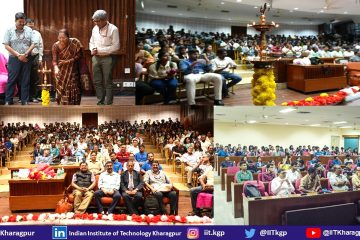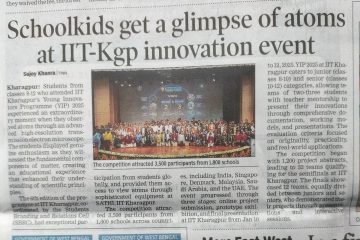IIT Kharagpur is the national coordinator of GIAN, an MHRD-run international outreach programme
 The Global Initiative of Academic Networks or GIAN was launched on November 30, 2015 by the then Union minister for human resources development, Ms Smriti Irani. The initiative intended to enhance the quality of higher education in India through foreign collaboration. At the inauguration Ms Irani said, “GIAN is not limited to only those from the IITs and national institutes but will also be available for government institutes who do not usually expect an opportunity to meet, interact and learn from international faculty.”
The Global Initiative of Academic Networks or GIAN was launched on November 30, 2015 by the then Union minister for human resources development, Ms Smriti Irani. The initiative intended to enhance the quality of higher education in India through foreign collaboration. At the inauguration Ms Irani said, “GIAN is not limited to only those from the IITs and national institutes but will also be available for government institutes who do not usually expect an opportunity to meet, interact and learn from international faculty.”
Under GIAN, reputed international faculty come to Indian academic institutions to take classes, engage in cutting-edge research jointly with the teaching faculty and students in these institutions, and are sometimes encouraged to take up issues that are of particular relevance to India. Students don’t have to go abroad to experience international standards of teaching, and the faculty in Indian institutions gain from the sharing of knowledge and skills with their international counterpart without having to leave their departments.
Since its launch in 2015, GIAN has gained wide currency in both India and abroad. The success of GIAN also indicates, in a way, the success of IIT Kharagpur, which is the national coordinator of the programme. IIT Kharagpur, in fact, has played a seminal role in the formation of GIAN. The programme owes its genesis to the International Summer Winter Term programme run by IIT Kharagpur.
 Both Professor A.N. Samanta, department of chemical engineering of IIT KGP, who was the principal investigator in the development of the GIAN portal, and Professor Adrijit Goswami, Mathematics department, who was co-principal investigator, hark back to the ISWT programme that IIT Kharagpur started in 2014. “After the successful conclusion of the programme that saw 30 courses being taught by international faculty, we went to the MHRD to talk about the programme and enlist its support for the continuation of ISWT,” says Professor Samanta. The ministry got back after three months, says Professor Samanta, with the recommendation that the MHRD run the programme and the programme be implemented on an all-India basis. “Since it was the IIT KGP’s initiative, the institute was appointed the national coordinator,” says Professor Samanta.
Both Professor A.N. Samanta, department of chemical engineering of IIT KGP, who was the principal investigator in the development of the GIAN portal, and Professor Adrijit Goswami, Mathematics department, who was co-principal investigator, hark back to the ISWT programme that IIT Kharagpur started in 2014. “After the successful conclusion of the programme that saw 30 courses being taught by international faculty, we went to the MHRD to talk about the programme and enlist its support for the continuation of ISWT,” says Professor Samanta. The ministry got back after three months, says Professor Samanta, with the recommendation that the MHRD run the programme and the programme be implemented on an all-India basis. “Since it was the IIT KGP’s initiative, the institute was appointed the national coordinator,” says Professor Samanta.
After discussing threadbare all the terms of the programme -its structure, funding, requisite software and so on – IIT Kharagpur got to work. It developed the GIAN portal, liaised with the approved colleges and universities throughout India and, together with the MHRD and the appointed coordinators in these institutions, started to implement GIAN.
“It was very demanding work initially,” says Professor Samanta, particularly since it was not easy to convince the educational institutions about the need and functioning of GIAN. There was also confusion about the credit structure in many colleges. The courses are of two types: the typical one credit course requires the foreign faculty to take classes for 10 to 14 hours over a period of at least one week covering 5 working days. The second type is the two credit course over a period of at least two weeks covering 10 working days. The courses involve regular evaluation mechanisms. Participating colleges are allowed to develop their own credit transfer mechanism.
In any institute running GIAN, departments are asked to suggest courses. Each insitute has a screening committee which screens the proposals. If this committee considers them valid, they send them to IIT KGP, which screens them again for technical flaws. That is, to see that courses are not duplicated. IIT KGP then sends the proposals for review. After review, recommendations again come to IIT KGP, which decides whether to approve or reject. After the academic review, the apex committee chaired by the IIT secretary decides of the matter. Then the committee meets or emails about the approved courses.
 The content of these courses are recorded so as to make it easily accessible to all and also to create an archive.
The content of these courses are recorded so as to make it easily accessible to all and also to create an archive.
The national coordinator of GIAN and director of IIT Kharagpur, Partha Pratim Chakrabarti, says “IIT Kharagpur has been among the leaders in science and technology education and research. The Institute’s leadership in the GIAN project reaffirms this. Our faculty members have been instrumental in the smooth execution of the project. They continue to play a crucial part in the project’s implementation.”
IIT Kharagpur is currently leading GIAN into its third phase. This involves coordination with the 187 participating institutes, scrutiny to see that no courses are repeated, upkeep of the portal and supervision so that the submission of proposals, their review and their culmination in college and university courses go without a hitch. IIT Kharagpur is also the coordinator for the group that includes all the IITs, NITs, IIIT, IIEST, SPA, that is, all the 55 institutes in this group. Dr Goswami, who runs the operation of this group with 55 co-coordinators, says with satisfaction, “We have streamlined the process to a great degree.” There are six such groups. The other groups include IISc, IISER, management schools, Central universities and law schools, AICTE approved engineering colleges and the Universities under UGC.
GIAN has completed more than 1100 courses and the international collaboration has translated into several international programmes and workshops. “After every phase there is a review meting,” says Professor Samanata, “where IIT Kharagpur, as GIAN’s national coordinator, reports to the MHRD about every detail of the implementation of the process, including the expenses. Till now the ministry is happy with the way IIT KGP has functioned.”
It might have been a lot of hard work, but IIT KGP has gained immensely from its involvement. “Much of the gain is indirect,” says Professor Samanata. Today, IIT Kharagpur is known internationally as the coordinator for GIAN. This has enhanced its international standing. IIT Kharagpur itself has seen innumerable proposals from its various departments getting translated into actual courses. So, the direct gains for its students and faculty are no less worthy.



